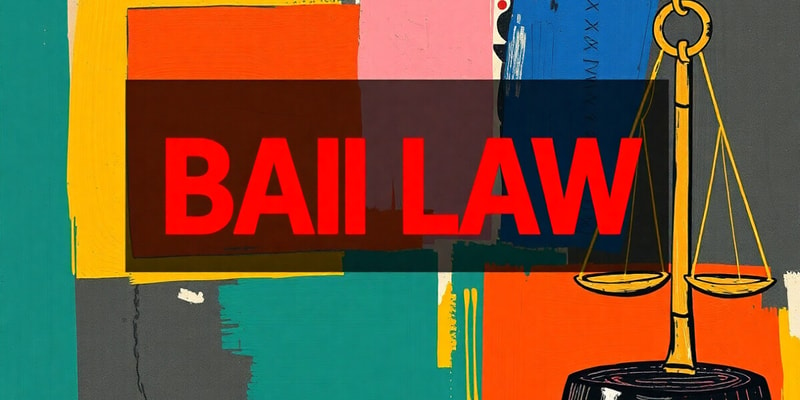Podcast
Questions and Answers
What must an accused person prove for the court to grant bail?
What must an accused person prove for the court to grant bail?
Which of the following is NOT a factor considered by the courts under the Yin Yang Factors when determining bail?
Which of the following is NOT a factor considered by the courts under the Yin Yang Factors when determining bail?
What condition may NOT typically be included in a bail agreement?
What condition may NOT typically be included in a bail agreement?
What is the primary purpose of the quantum of bail set by the court?
What is the primary purpose of the quantum of bail set by the court?
Signup and view all the answers
What is a significant problem concerning the Criminal Case Disclosure Conference (CCDC)?
What is a significant problem concerning the Criminal Case Disclosure Conference (CCDC)?
Signup and view all the answers
What is the minimum time frame required for filing a Notice of Motion before a hearing?
What is the minimum time frame required for filing a Notice of Motion before a hearing?
Signup and view all the answers
According to the Criminal Procedure Code, what is the primary responsibility of the Magistrate's Court in relation to seized property?
According to the Criminal Procedure Code, what is the primary responsibility of the Magistrate's Court in relation to seized property?
Signup and view all the answers
In which situation is the forfeiture of property considered mandatory rather than discretionary?
In which situation is the forfeiture of property considered mandatory rather than discretionary?
Signup and view all the answers
What does Section 364(1) of the CPC empower the court to do regarding property produced before it during a trial?
What does Section 364(1) of the CPC empower the court to do regarding property produced before it during a trial?
Signup and view all the answers
What is the primary purpose of Section 372 of the CPC in relation to property entitlement?
What is the primary purpose of Section 372 of the CPC in relation to property entitlement?
Signup and view all the answers
What must the Prosecution disclose to the Defence according to s162 CPC?
What must the Prosecution disclose to the Defence according to s162 CPC?
Signup and view all the answers
What is the maximum timeframe within which the court must fix a CCDC date after the accused opts in, as specified in s167 CPC?
What is the maximum timeframe within which the court must fix a CCDC date after the accused opts in, as specified in s167 CPC?
Signup and view all the answers
Which of the following statements is NOT a purpose specified under s160 CPC?
Which of the following statements is NOT a purpose specified under s160 CPC?
Signup and view all the answers
According to s165 CPC, what must the Defence's case include?
According to s165 CPC, what must the Defence's case include?
Signup and view all the answers
What happens if the prosecution fails to serve cases in the required timeframe under s169 CPC?
What happens if the prosecution fails to serve cases in the required timeframe under s169 CPC?
Signup and view all the answers
For which type of court does CCDC apply according to the provided content?
For which type of court does CCDC apply according to the provided content?
Signup and view all the answers
Under the CCDC procedures, when does an accused automatically qualify for these procedures?
Under the CCDC procedures, when does an accused automatically qualify for these procedures?
Signup and view all the answers
When must the Defence bundle be filed according to s163 CPC?
When must the Defence bundle be filed according to s163 CPC?
Signup and view all the answers
What is outlined in s210 CPC regarding case transmission?
What is outlined in s210 CPC regarding case transmission?
Signup and view all the answers
What is the rule regarding the accused's choice in opting out of the CCDC procedures?
What is the rule regarding the accused's choice in opting out of the CCDC procedures?
Signup and view all the answers
Which of the following offences is considered a bailable offence?
Which of the following offences is considered a bailable offence?
Signup and view all the answers
According to the Criminal Procedure Code, when must bail be offered as of right?
According to the Criminal Procedure Code, when must bail be offered as of right?
Signup and view all the answers
Which statement about non-bailable offences is correct?
Which statement about non-bailable offences is correct?
Signup and view all the answers
In which scenario can a police officer or court grant bail for a non-bailable offence?
In which scenario can a police officer or court grant bail for a non-bailable offence?
Signup and view all the answers
Which of the following statements regarding bailable and non-bailable offences is false?
Which of the following statements regarding bailable and non-bailable offences is false?
Signup and view all the answers
Which of the following conditions leads to an accused not being released on bail?
Which of the following conditions leads to an accused not being released on bail?
Signup and view all the answers
What must the court do if a plea in mitigation is qualified?
What must the court do if a plea in mitigation is qualified?
Signup and view all the answers
Under what circumstances can an offender retract a guilty plea?
Under what circumstances can an offender retract a guilty plea?
Signup and view all the answers
Which of the following is a key factor the court may consider when deferring a sentence?
Which of the following is a key factor the court may consider when deferring a sentence?
Signup and view all the answers
During the trial, how can a report by a qualified person be used as evidence?
During the trial, how can a report by a qualified person be used as evidence?
Signup and view all the answers
What action is permitted by the court regarding antecedents in sentencing?
What action is permitted by the court regarding antecedents in sentencing?
Signup and view all the answers
What must occur after retraction of a guilty plea is accepted?
What must occur after retraction of a guilty plea is accepted?
Signup and view all the answers
What does s364 CPC pertain to regarding court decisions?
What does s364 CPC pertain to regarding court decisions?
Signup and view all the answers
What is required for the court to take consideration of an offense?
What is required for the court to take consideration of an offense?
Signup and view all the answers
What must the Defence do when making closing submissions?
What must the Defence do when making closing submissions?
Signup and view all the answers
What is the burden of proof in a criminal case?
What is the burden of proof in a criminal case?
Signup and view all the answers
What happens if the Court finds an accused not guilty?
What happens if the Court finds an accused not guilty?
Signup and view all the answers
When can the Prosecution make a final right of reply?
When can the Prosecution make a final right of reply?
Signup and view all the answers
What must occur before a witness can be impeached based on a prior inconsistent statement?
What must occur before a witness can be impeached based on a prior inconsistent statement?
Signup and view all the answers
In the event of an appeal, what is the time limit for filing a notice of appeal?
In the event of an appeal, what is the time limit for filing a notice of appeal?
Signup and view all the answers
What is the consequence of a successful impeachment of a witness?
What is the consequence of a successful impeachment of a witness?
Signup and view all the answers
What limitation exists regarding appeal against an acquittal in private prosecutions?
What limitation exists regarding appeal against an acquittal in private prosecutions?
Signup and view all the answers
Study Notes
Taking Instructions
- Obligations under the Legal Profession (Professional Conduct) Rules 2015 for Prosecutors
- Within a reasonable time after a conviction but before sentencing, inform the court of:
- Any previous convictions of the accused.
- Relevant factors and precedents for the sentence.
- Any known mitigating circumstances if the accused is unrepresented.
- Within a reasonable time after a conviction but before sentencing, inform the court of:
- Obligations under the Legal Profession (Professional Conduct) Rules 2015 for Defence Counsel
- When conducting proceedings for a client, do not:
- Fabricate evidence or facts, regardless of whether it supports the client's case.
- Draft legal documents (originating process, pleadings, affidavits, witness statements, or notices) containing unsupported or unreasonable allegations.
- Draft such documents containing fraud allegations without verifiable evidence.
- Draft such documents containing factual statements that a witness would not give orally, if requested, by their instructions.
- When conducting proceedings for a client, do not:
- Obligations when defending an accused regardless of personal opinion (Rule 14(3)(b)). A legal practitioner representing an accused must not express personal opinion on the guilt of that person nor let this affect professional assessment of facts or the law, nor legal practitioner's conduct of the proceedings.
Absence from Trial or Hearing
- A legal practitioner representing an accused must not be absent from a trial or hearing without reasonable grounds.
- Communicate the grounds for absence to the accused person before the trial or hearing.
- Make reasonable efforts to arrange for another legal practitioner to take over the proceeding.
Accused Absconding
- If an accused absconds, the legal practitioner representing them may:
- Apply to be discharged from representing them.
- Continue to conduct the defence based on existing instructions, as if the person was present but silent.
Disclosure of Previous Convictions
- Legal practitioners representing an accused are not required to disclose previous convictions or antecedents, but must not adduce evidence or make submissions that are inconsistent with them.
Advising Client to Plead
- Legal practitioners must advise an accused whether to plead guilty or claim trial.
Mitigation Plea
- If the accused has pleaded guilty or been found guilty in trial, the legal practitioner representing them must not make scandalous allegations or intended to vilify, insult, or annoy anyone.
Studying That Suits You
Use AI to generate personalized quizzes and flashcards to suit your learning preferences.




